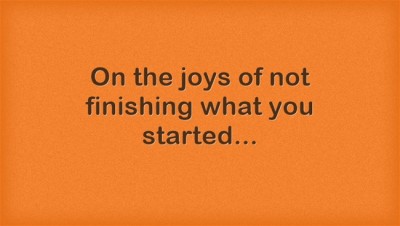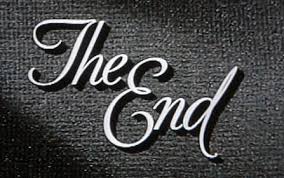Why It’s Sometimes Okay to Quit
 As a child, I hated horseback riding. I took lessons, though, because my mother wanted me to, and because I was under the impression that girls were supposed to like horses. The day after my twelfth birthday, during my riding lesson, our horse reared back, and I fell off. I landed on my back on the ground, but that was just the beginning of it. I can still remember watching the horse struggle in the air above me before she fell backward, her body slamming down on top of me, grinding the bulky Western saddle into my eighty-pound frame. She rolled around on top of me, trying to get up. Looking back, I’m amazed that I suffered only a broken pelvis and fractured hips.
As a child, I hated horseback riding. I took lessons, though, because my mother wanted me to, and because I was under the impression that girls were supposed to like horses. The day after my twelfth birthday, during my riding lesson, our horse reared back, and I fell off. I landed on my back on the ground, but that was just the beginning of it. I can still remember watching the horse struggle in the air above me before she fell backward, her body slamming down on top of me, grinding the bulky Western saddle into my eighty-pound frame. She rolled around on top of me, trying to get up. Looking back, I’m amazed that I suffered only a broken pelvis and fractured hips.
Months later, after my body had (for the most part) healed, I confessed to my mother that I was not and never had been enamored of horses. I did not like the way they smelled, I didn’t like mucking the stalls, I hated the clouds of dust rising from the horse’s flanks when I brushed her. Most of all, I did not like lying beneath a horse while it rolled around on top of me. “I don’t want to ride anymore,” I said, lying flat on my back in a hospital bed, my legs in traction. “I quit.” Fortunately, she did not tell me to “get back in the saddle.” I have lived a relatively horseless life, and that has not bothered me one bit.
My high school career began at Mobile Christian School (Mobile being a city, not a state of being). A few weeks into the first semester of my freshman year, I got sent to the office for wearing orange socks.For this offense, I was shut in a room with the varsity football coach who, acting on the orders of the principal, told me to bend over. The coach, clearly mortified, gave me a couple of weak smacks with the wooden paddle that was reserved for juvenile offenders like me. The school called my mother only after the corporal punishment had been administered. “I quit,” I said. “I’m not going back.” The next day, I enrolled in the public school, Murphy High. A couple of months later, Murphy made national news because the district was so underfunded, students had to bring our own toilet paper. Despite the financial difficulties, it was a terrific school. My teachers were amazing. Did I ever regret quitting the private school that meted out spankings to girls in short plaid skirts? I did not.
In tenth grade, I quit youth choir because the songs they made us sing were terrible. “Contemporary Christian,” it was called. All pep, no feeling. Lots of poorly thought-out rhymes. Bad robes in unappealing shades of burgundy and pink. I told the choir director I’d stay if he’d let us sing Madonna’s “Like a Prayer.” He was tolerant but unconvinced. Have I ever regretted my decision to quit the youth choir? Not once. Eventually, I quit the Baptist church altogether. I discovered that life is better with more wine and less guilt.
In college, I had a string of odd jobs. One involved pulling auto parts at a warehouse for $3.75 per hour. It was sweltering hot, the ladders were rickety, and at five foot two, even with the ladders, many of the parts were beyond my reach. I hung in there for a week; then I quit. Remorse? None.
Another college job involved opening a convenience store in Northport, Alabama, at five in the morning. For this I was paid the more amendable sum of $4.25 per hour. One morning, alone in the convenience store, I heard shots ringing out from the crack house across the street. That day, I quit. I never looked back.
I briefly worked at a small airport in Tuscaloosa, Alabama. My responsibilities included calculating fuel for small aircrafts. Math has never quite been my thing. Fuel, as it turns out, is important. It only took a few days for me to realize the folly of this situation. I quit; the pilots did not complain.
Right after college, I quit a waitressing job in Knoxville, Tennessee, after the owner slipped something in my drink and the chef took humiliating photos while I was unconscious in the storage room. Soon thereafter, I found a job as a copywriter at an advertising firm. Quitting a bad thing led to a good thing. Once again, no regrets.
Over the years, I quit a variety of things for a variety of reasons: I quit the pill because it made me fat. I quit Bikram yoga because it made me stink and did not bring me anything akin to peace. I quit Moby Dick, three times. In the early nineties, I quit an engagement. Thank goodness. I quit the MFA program at the University of Arkansas and transferred to the University of Miami, because I wanted to live on the beach. I loved living on the beach; I did not love living in Arkansas. I knew then, as I know now, that life is too short to live somewhere unappealing.
While I was living in New York City, I quit wearing shoes that hurt. My husband and I quit New York City to live in San Francisco, because San Francisco has good air and good food and good views, and it made us very happy. A couple of years ago, I finally quit trying to do fancy things to asparagus, because, as it turns out, most vegetables, including asparagus, taste better steamed, with a little butter and salt, without the bells and whistles.
A few years ago, I’d been struggling for two years with a novel I was writing on contract, unable to find my way, when I finally confessed to my editor that the book just wasn’t working. “Do you think you could write something else?” she asked. Strangely, that simple solution had never occurred to me. After all, I had invested 300 pages and hundreds of hours in the book, and the thought of abandoning it seemed obscene. But I took my editor up on her offer. I quit the failed book, the bad book, the book that simply was not working. Days later, officially released from the unwieldy mass of my failed manuscript, I started from scratch. Blank page, new premise; new characters, voice, and setting. The freedom proved exhilarating, and the result was a much better novel than the one I’d been tied down to, the one I had been so reluctant to quit.
Our impulse as human beings is to finish what we started, to overemphasize our investment and continue along the path to which we’ve committed, no matter what. Our impulse as writers is to attempt to salvage the words, to make good on the promise we made to ourselves when we penned the very first line. While there is beauty in perseverance, and while there are, of course, some things you shouldn’t quit, some things that are more than worth the long and arduous journey, sometimes the best thing you can do, in stories as in life, is let something go, and give yourself the freedom to begin again.
Think of one thing in your life that isn’t working. Not something that is simply difficult, not something that is challenging but worthwhile. No, I mean something that adds no meaning to your life, something that adds unnecessary pain or unhappiness or outright despair with no hope of self-improvement or valuable public service or future positive return. Now, repeat after me, “I quit.” Commit to the end of this thing you are quitting. Watch the space open up in front of you. Begin again.
 Stories are like relationships: the beginning is always so much fun, and the ending is fraught with turmoil.
Stories are like relationships: the beginning is always so much fun, and the ending is fraught with turmoil.

